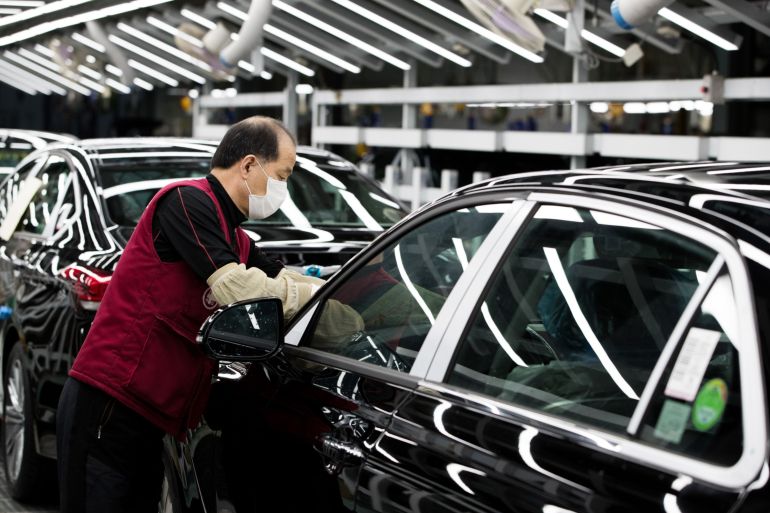South Korea’s autoworkers support banning petrol cars: poll
Poll finds 82 percent of employees believe sales of internal combustion engine vehicles should be banned by 2035.

Eight out of 10 autoworkers in South Korea support banning sales of petrol and diesel vehicles by the middle of the next decade, a survey has found.
More than 82 percent of employees in the industry believe vehicles with internal combustion engines should not be sold after 2035, while nearly 64 percent say a ban should be introduced by 2030, according to the survey released on Thursday by Greenpeace and the Korean Metal Workers’ Union.
Keep reading
list of 4 itemsProtesters, power cuts and Sri Lanka’s persistent president
Under Israeli surveillance: Living in dystopia, in Palestine
How is the war in Ukraine creating a global food emergency?
Over 94 percent of respondents said they viewed climate change as “extremely” or “very” serious, with a nearly identical proportion agreeing that it would cause irrecoverable damage to both the global and South Korean economy if not stopped.
The nationwide survey, conducted by The Research Group, a polling organisation, was based on responses from 1,019 workers at Hyundai Motors, Kia and GM Korea.
South Korean president-elect Yoon Suk-yeol has pledged to ban sales of vehicles with internal combustion engines by 2035, as part of South Korea’s commitment to become carbon neutral by 2050.
Yoon’s plan has generated resistance from industry bodies, including the Korea Automobile Manufacturers Association and Korea Automobile Parts Association, which have warned that the timeline for transitioning fully to electric cars is unrealistic.
Daul Jang, Greenpeace East Asia government relations and advocacy specialist, said the outcome of the poll showed that workers are “thinking more progressively than the corporations they work for”.
“The results of this survey send a strong signal to President-elect Yoon that he needs to follow through on his election pledge to ban the new registration of internal combustion engine vehicles by 2035,” Jang said. “After all, it is corporate leadership that is holding back ambitious climate action, not auto industry employees.”
Deok-heon Son, vice president of the Korean Metal Workers’ Union, said that the industry’s workers view climate change as an economic as well as environmental crisis.
“An earlier transition to electric vehicles would be a smarter strategy to tackle the climate crisis as well as to ensure the competitiveness of the Korean auto industry,” Son said. “The transition must be just and inclusive, and workers and unions need to be respected as key stakeholders in the process.”
There were nearly 232,000 electric vehicles registered in South Korea in 2021, compared with more than 21 million petrol and diesel cars, according to data from the Ministry of Land, Infrastructure and Transport.
South Korean carmakers have laid out plans to dramatically boost sales of eco-friendly vehicles in the coming years, with leading player Hyundai aiming for electric vehicles to make 36 percent of all sales by 2030.